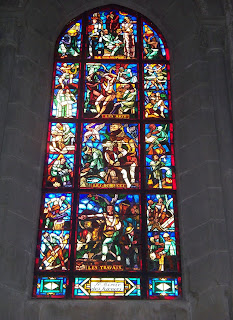The Real Conspiracy
Recently a close friend, whom I greatly admire, told me that he had a hard time believing that the World Trade Center towers fell as a result of the planes that were crashed into them. Usually, I don't take comments like that seriously; they tend to come from people who are slightly unhinged and to be followed by incredibly bizarre explanations, such as when a Kuwaiti told me "the Jews" were behind it all. (The Lady, who is half-Jewish, was surprised to learn of her role in the September 11th attacks.) But this friend is level-headed, intelligent, studying for the ministry, and solidly patriotic (as evidenced by 8 1/2 years enlisted in the Air Force, and now a commission as a Second Lieutenant).
His own qualifications don't cause me to believe that theory for a second, and I would challenge anyone to find a structural engineer who actually believes the towers fell for some other reason. But it does go to show we all can be drawn to any explanation which posits that something bigger is going on.
His own qualifications don't cause me to believe that theory for a second, and I would challenge anyone to find a structural engineer who actually believes the towers fell for some other reason. But it does go to show we all can be drawn to any explanation which posits that something bigger is going on.
These days, there are conspiracy theories for everything: the JFK assassination, September 11th, the Iraq War, aliens, the economic crisis, the Palestinian-Israeli conflict, health care, immigration, AIDS, gun control, the Roman Catholic Church, and Christianity as a whole. A 1997 movie even capitalized on the trend. Virtually none of them have been proven, all are perpetuated with the scantest of evidence and most far-fetched of reasoning, and many have in fact been disproven. But they persist. As soon as one is debunked, another pops up in its place.
The probability that a secret will be leaked increases exponentially with the number of people who know. All it takes is slight pressure, or a slight mistake, for someone to slip up. For instance, if 50 people know a secret, and each has only a 1 in 1000 chance of spilling the beans in a certain time period, then the probability of the secret getting out is:
1- (1-0.001)^50 = 5%
Not bad, although still risky. But what if the heat is on, ever so slightly, and now the probability of someone breaking is even 1 in 100?
1- (1-0.01)^50 = 39%
Or what if 100 people know?
1- (1-0.01)^100 = 63%
The odds are looking poor. But this analysis fails to take into account the fact that the first one to talk will probably have a better chance of saving his or her skin.
The idea that our lumbering and often-inept American federal government could manage to maintain a vast conspiracy is simply laughable. The idea that a massive corporation, employing tens of thousands of people and interacting with the public continually, could be secretly running the world is equally farcical.
1- (1-0.001)^50 = 5%
Not bad, although still risky. But what if the heat is on, ever so slightly, and now the probability of someone breaking is even 1 in 100?
1- (1-0.01)^50 = 39%
Or what if 100 people know?
1- (1-0.01)^100 = 63%
The odds are looking poor. But this analysis fails to take into account the fact that the first one to talk will probably have a better chance of saving his or her skin.
The idea that our lumbering and often-inept American federal government could manage to maintain a vast conspiracy is simply laughable. The idea that a massive corporation, employing tens of thousands of people and interacting with the public continually, could be secretly running the world is equally farcical.
In the Modern Era, we would like to believe that science has exorcised all of the demons from our world. There is a perfectly rational explanation for everything. Human beings do things, even bad things, for simple and comprehensible motives... and that's it. The world works according to certain laws. And beyond that, there is nothing but personal subjective opinion. There is no grand story, no big picture. The world simply is what it is, and anything we can't explain will be explained soon enough by physics or evolution. (This is, by the way, the worldview of The Economist).
Deep down, we know that there is something else at work. We don't just "want to believe," we actually sense that there is something truly nefarious behind it all, working the invisible strings for malevolent ends. We have lost the capability to describe who or what this is. So we turn to conspiracy theories - or we settle for our modern explanations.
The corollary to this, is that whoever does not believe in The Devil, will believe in conspiracy theories. A recent poll shows that only 68% of Americans believe in a personal devil, and in my experience far fewer actually take that Being seriously. But having rejected as old-fashioned nonsense the real Conspirator, the true Enemy - with all his accomplices - we chase one human conspiracy after another for the slightest of reasons. We know there is something bigger - and far more evil - behind all that we see, but we are suppressing this knowledge.
But if you don't like that, there's always The X-Files.
Labels: Culture, Philosophy, Theology


